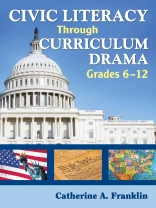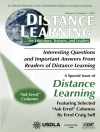‘Offers educators a powerful method for making learning essential to students′ experience. Once they enter a curriculum drama, students become actors in a dynamic world that engages them intellectually, emotionally, and intuitively. They must sharpen their thinking, communicate effectively, and write and speak persuasively to be part of the action. Franklin is an imaginative and thoughtful guide taking teachers and students into the fertile territory of history brought to life.’
—Judith Ghinger, Early College Liaison
The City College of New York
Make social studies accessible, relevant, and engaging with standards-based curriculum drama!
Curriculum drama is a student-centered, inquiry-based teaching method in which the teacher facilitates dramatic activities that engage students′ interest and imagination, develop critical thinking skills, and promote collaboration.
Civic Literacy Through Curriculum Drama, Grades 6–12 shows educators how to provide rigorous and innovative opportunities for students to experience the social studies curriculum firsthand, from mock trials to classroom senates to political campaigns. Rooted in constructivism, these realistic experiences develop deep knowledge and understanding as students research and take on the roles of senators, judges, lawyers, campaign managers, lobbyists, and political activists. Aligned to National Council for the Social Studies standards, this field-tested, hands-on guide features:
- Step-by-step guidelines for constructing curriculum dramas based on historical cases, current events, and the legislative process
- Sample dramas, student voices, and activity sheets to help teachers get started
- An extensive, detailed example showing what curriculum drama looks and sounds like in the classroom
Transform civics instruction into a dynamic, student-driven discourse that will help your students become informed, critically minded, socially conscious citizens.
विषयसूची
Preface
Acknowledgments
About the Author
1. Curriculum Drama: An Engaging Approach to Social Studies
Understanding Curriculum Drama
Using Curriculum Drama to Meet Standards
Emerging From Educational Drama
Summary
What’s Next?
2. Constructing Curriculum Drama: Exploring Its Structure
The Inner Workings of Curriculum Drama
Using a Blueprint
Setting the Stage
Multiple Entry Points
Summary
What’s Next?
3. Becoming a Senator: Setting the Stage
Starting With a Blueprint: U.S. Constitution
Setting the Stage
Selecting States for the Classroom Senate
Recognizing the Senators: An Event
Researching the States in in the Classroom Senate
Researching U.S. Senators
Summary
What’s Next?
4. Political Parties: Building Belief
Consulting With a Blueprint: U.S. Senate
Setting the Stage
Creating Political Affiliations
Recognizing Political Groups: An Event
Constructing a Political Agenda
Classroom Dilemma: Encountering Disbelief
Summary
What’s Next?
5. Holding an Election: Engaging in Multiple Entry Points
Setting the Stage
Electing Leaders Within the Party
Consulting With a Blueprint – President Pro Tempore
Thinking Strategically
Secret Ballot Election: An Event
Classroom Dilemma: Breaking Too Soon From an Event
Summary
What′s Next?
6. Current Events: Doing Legislative Work
Setting the Stage
Consulting With a Blueprint and Constructing Legislation
Introducing Legislation: An Event
Appraising Legislation
Engaging in Committee Work
Classroom Dilemma: Discord in Small Group Work
Curriculum Drama in Action: Committee Work
Summary
What’s Next?
7. Constructing a Hearing: Appraising Witness Testimony
Prioritizing Legislation
Setting the Stage
Witness Testimony: An Event
Curriculum Drama in Action: Witness Testimony
Classroom Dilemma: Rupture of Credibility
Summary
What’s Next?
8. Constructing a Debate: Taking Legislative Action
Committee Decision
Setting the Stage
Senate Debate: An Event
Curriculum Drama in Action: Senate Debate
Classroom Dilemma: Going Along With Student Decisions
Summary
What’s Next?
9. Constructing Curriculum Drama in Other Contexts
Current Events: World Summit on Peace
History: Should Women Vote?
Law: A Criminal Trial
Concluding Words: Letting the World In
Glossary
Resources
A. Oath of Office
B. Research Guidelines: State Report
C. Research Guidelines: Getting to Know a U.S. Senator
D. Activity: Determining Political Affiliations
E. List of Senators in a Classroom Senate
F. Activity: Working on a Political Platform
G. Activity: Creating Legislation
H. Committee Tasks
I. Classroom Legislation: S 125, “Clean Air”
J. Classroom Legislation: S 121, “Reducing Crime”
K. Testimony: Dr. Van Schick
L. Testimony: Mr. Will Cart
M. Activity: Constructing an Amendment
N. Excerpts From a Debaters’ Handbook
References
Index
लेखक के बारे में
Catherine A. Franklin is an assistant professor in the School of Education at The City College of the City University of New York. She teaches social studies education to both undergraduates and graduates. She began her career by teaching in schools around the world (e.g., Colombia, Japan). In New York City, she was a middle school classroom teacher for over ten years. Along with teaching social studies, literature, and writing to eighth-grade students, she worked as a cooperating teacher for student teachers who were placed in her classroom. She earned her Ed D at Teachers College, Columbia University in the Curriculum and Teaching Department and her MA in international education from Lesley University. She consults on social studies education and curriculum design.












